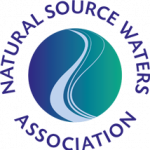The Natural Source Waters Association is today (15th October 2020) announcing the launch of an innovative, new category campaign, encouraging the consumption of natural source waters.
‘Uncapped Natural Taste’, is aimed at young adults (16-34 year olds) and will be activated on social media platforms from next week. With an investment of over £100k, the six week campaign seeks to generate interest and engagement in the attributes of natural source waters, such as health and naturality.
This is the first time in over ten years that natural source water producers have come together to communicate to consumers. The creative assets convey messages around the unique properties of natural source waters, including their taste and provenance. The campaign also underlines that the plastic bottles used by natural source water companies are 100% recyclable and it encourages consumers to recycle them when empty so they can be made into new bottles. All our members are committed to using recycled content in their bottles and supporting a circular economy for their packaging.
Many people believe natural source waters or ‘bottled water’ is just tap water in a bottle, which is why they might choose to buy an alternative soft drink that they can’t “get out of a tap” such as sugar sweetened soft drinks. Natural source waters come from protected underground sources and are not chemically treated. Instead, the water filters through layers of rock over many years, making them safe to drink, with the geology of the area giving each water its own unique mineral characteristics and taste.
In research conducted in May 2020 with 2,000 consumers, the top reasons for choosing natural source waters were taste, naturality and health, which all indexed strongly at around 32-33%, with purity also scoring well at 23%.
The ‘Uncapped Natural Taste’ campaign shows a young female adult skateboarding in an urban park, leaving a trail of graffiti behind her, which paints the picture of an ‘underground natural water source’. The end frame includes brand logos from all the members of the NSWA and include a recycling message. Further information and the campaign content are available at https://uncappednaturaltaste.com/ . This includes a 30 second film as well as the shorter films that will be activated across YouTube, Facebook and Instagram in a paid-for media campaign.
Kinvara Carey, General Manager, Natural Source Waters Association said: “With the Government focus on tackling obesity, there has never been a better time to encourage healthier eating and drinking. Natural source waters are the healthiest drink on the shelf and have the lowest environmental footprint within the soft drinks category”.
James Pearson, Managing Director of Danone Waters UK & Ireland said, “We know that many people prefer the taste of natural source waters. Natural source waters are filtered through nature for years and have nothing added to them providing their unique taste. As a category, we want to help consumers understand more about natural source waters so they can make healthy choices.”
Les Montgomery, Chief Executive of Highland Spring commented, “Our category has a great provenance story to tell, and we hope this new campaign helps consumers understand what makes natural source waters special and different, by bringing-to-life the journey of the product from source to shelf. As responsible producers, we want to help consumers make informed choices that enable them to stay healthily hydrated, whilst ensuring it is easy for them to recycle their packaging after use.”
Michel Beneventi, Managing Director, Nestlé Waters UK said, “It is fantastic to come together as producers with a consumer facing campaign for the first time in more than ten years about our natural source waters. We are united in our passion for healthy hydration, preserving and protecting our natural environment and that includes reminding everyone that our packaging is fully recyclable. Every bottle counts, they are only waste if you waste them. I hope this campaign reaches young audiences and makes them feel good, not only about the water inside the bottle, but that they can help play a part in creating a circular economy for plastic.”
The campaign was produced by Brave Spark Media.
Notes to editors
Natural source waters
- The Natural Source Waters Association (NSWA), formerly the Natural Hydration Council (NHC), represents producers of natural source waters in the UK.
- Natural source waters are: Natural Mineral Water, Spring Water and Bottled Drinking Waters that come from underground sources.
- Natural Source Waters Association members are Brecon Carreg, Danone Waters UK and Ireland, Harrogate Water Brands, Highland Spring, Montgomery Waters, Nestlé Waters UK, Roxane, Shepley Spring and Wenlock Spring.
- Natural source waters all come from protected underground sources and must be safe to drink from source as they cannot be chemically treated, unlike tap water which comes from a variety of sources, such as reservoirs and rivers, and undergoes an industrial process to make it safe to drink.
- Natural source waters have the lowest environmental impact of all soft drinks.[1]
- Members of the Natural Source Waters Association are instrumental in protecting 350,000 acres of land in the United Kingdom, the equivalent of the Peak District National Park.
- For more information go to www.naturalsourcewaters.org.uk or call 0208 996 5115.
Packaging
- NSWA producers use packaging that is 100% recyclable, with many now using recycled content in their bottles.
- NSWA and its members are supportive of the introduction of a Deposit Return Scheme (DRS) in the UK and are working with DEFRA and the Scottish Government to help progress these plans.
- In a recent study from Cambridge University, PET plastic packaging came out as one of the lowest environmental impact materials across a number of environmental metrics.[2]
[1] WSP, 2020 Sustainability Roadmap Update Report
[2] Cambridge Institute for Sustainability Leadership, Towards sustainable packaging materials https://www.cisl.cam.ac.uk/resources/circular-economy/towards-sustainable-packaging-relative-impact-of-materials


